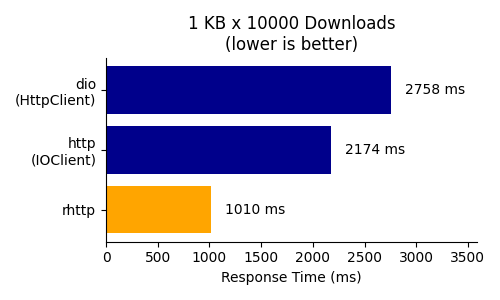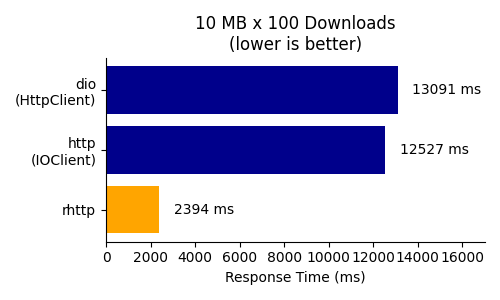rhttp 0.4.0  rhttp: ^0.4.0 copied to clipboard
rhttp: ^0.4.0 copied to clipboard
Make HTTP requests using Rust for Flutter developers. It uses FFI to call Rust functions from Dart. On the Rust side, it uses reqwest to make HTTP requests.
rhttp #
Make HTTP requests using Rust for Flutter developers.
About #
The default HTTP client in Dart is part of dart:io, which lacks configurability and performance compared to other HTTP clients.
Furthermore, HTTP/2 and HTTP/3 are either missing or not supported by default.
This package uses FFI with flutter_rust_bridge to call Rust code. This allows you to use a faster and more efficient HTTP client.
On Rust's side, the reqwest crate is used to make the requests.
Why shouldn't I use cronet_http or cupertino_http? These packages for instance only support Android or iOS, while rhttp supports all platforms (except web currently) with a single configuration.
Features #
- ✅ HTTP/1, HTTP/1.1, HTTP/2, and HTTP/3 support
- ✅ TLS 1.2 and 1.3 support
- ✅ Connection pooling
- ✅ Strong type safety
- ✅ Optional compatibility layer for the http package
Benchmark #
rhttp is much faster at downloading large files and a bit faster at downloading small files compared to the default HTTP client in Dart.


Referred packages: dio (5.5.0+1), http (1.2.2), rhttp (0.3.0)
Checkout the benchmark code here.
Getting Started #
➤ Installation #
- Install Rust via rustup.
- Rust 1.80.0 or later is required.
- Add
rhttptopubspec.yaml:
dependencies:
rhttp: <version>
➤ Initialization #
import 'package:rhttp/rhttp.dart';
void main() async {
await Rhttp.init(); // add this
runApp(MyApp());
}
➤ Usage #
import 'package:rhttp/rhttp.dart';
void main() async {
await Rhttp.init();
// Make a GET request
HttpTextResponse response = await Rhttp.get('https://example.com');
// Read the response
int statusCode = response.statusCode;
String body = response.body;
}
Alternatively, you can use the RhttpCompatibleClient that implements the Client of the http package.
For more information, see Compatibility Layer.
import 'package:rhttp/rhttp.dart';
import 'package:http/http.dart' as http;
void main() async {
await Rhttp.init();
http.Client client = await RhttpCompatibleClient.create();
http.Response response = await client.get(Uri.parse('https://example.com'));
print(response.statusCode);
print(response.body);
}
Features #
➤ HTTP methods #
You can make requests using different HTTP methods:
// Pass the method as an argument
await Rhttp.request(method: HttpMethod.post, url: 'https://example.com');
// Use the helper methods
await Rhttp.post('https://example.com');
➤ Request query parameters #
You can add query parameters to the URL:
await Rhttp.get('https://example.com', query: {'key': 'value'});
➤ Request Headers #
You can add headers to the request:
await Rhttp.request(
method: HttpMethod.get,
url: 'https://example.com',
headers: const HttpHeaders.map({
HttpHeaderName.contentType: 'application/json',
}),
);
➤ Request Body #
You can add a body to the request. There are different types of bodies you can use:
Text
Pass a string to the HttpBody.text constructor.
// Raw body
await Rhttp.request(
method: HttpMethod.post,
url: 'https://example.com',
body: HttpBody.text('raw body'),
);
JSON
Pass JSON map to the HttpBody.json constructor.
The Content-Type header will be set to application/json if not provided.
// JSON body
await Rhttp.request(
method: HttpMethod.post,
url: 'https://example.com',
body: HttpBody.json({'key': 'value'}),
);
Binary
Pass a Uint8List to the HttpBody.bytes constructor.
// Binary body
await Rhttp.request(
method: HttpMethod.post,
url: 'https://example.com',
body: HttpBody.bytes(Uint8List.fromList([0, 1, 2])),
);
Form
Pass a flat map to the HttpBody.form constructor.
The Content-Type header will be set to application/x-www-form-urlencoded if not provided.
// Form body
await Rhttp.request(
method: HttpMethod.post,
url: 'https://example.com',
body: HttpBody.form({'key': 'value'}),
);
Multipart
Pass a map of MultipartItem to the HttpBody.multipart constructor.
The Content-Type header will be overridden to multipart/form-data with a random boundary.
await Rhttp.request(
method: HttpMethod.post,
url: 'https://example.com',
body: HttpBody.multipart({
'name': const MultipartItem.text(
text: 'Tom',
),
'profile_image': MultipartItem.bytes(
bytes: Uint8List.fromList(bytes),
fileName: 'image.jpeg',
),
}),
)
➤ Response Body #
To let Rust do most of the work, you must specify the expected response body type before making the request.
Most convenience functions (e.g. Rhttp.get, Rhttp.request) return a HttpTextResponse.
HttpTextResponse response = await Rhttp.getText('https://example.com');
String body = response.body;
HttpBytesResponse response = await Rhttp.getBytes('https://example.com');
Uint8List body = response.body;
HttpStreamResponse response = await Rhttp.getStream('https://example.com');
Stream<Uint8List> body = response.body;
➤ Connection Reuse #
To improve performance, it is recommended to create a client and reuse it for multiple requests.
This allows you to reuse connections (with same servers). Furthermore, it avoids the overhead of creating a new client for each request.
final client = await RhttpClient.create();
await client.get('https://example.com');
You can dispose the client when you are done with it:
client.dispose();
➤ Cancel Requests #
You can cancel a request by providing a CancelToken:
final cancelToken = CancelToken();
final request = Rhttp.get(
'https://example.com',
cancelToken: cancelToken,
);
// Cancel the request
cancelToken.cancel();
// Will throw a `RhttpCancelException`
await request;
➤ Error Handling #
All exceptions are subclasses of RhttpException.
The following exceptions can be thrown:
| Exception | Description |
|---|---|
RhttpCancelException |
Request was canceled. |
RhttpTimeoutException |
Request timed out. |
RhttpStatusCodeException |
Response has 4xx or 5xx status code. |
RhttpInvalidCertificateException |
Server certificate is invalid. |
RhttpInvalidClientException |
Request is made with an invalid client. |
RhttpUnknownException |
Unknown error occurred. |
➤ Timeout #
You can specify the timeout for the request:
await Rhttp.get(
'https://example.com',
settings: const ClientSettings(
timeout: Duration(seconds: 10),
connectTimeout: Duration(seconds: 5),
),
);
➤ Throw on Status Code #
By default, an exception is thrown if the response has a 4xx or 5xx status code.
You can disable this behavior by setting throwOnStatusCode to false.
await Rhttp.get(
'https://example.com',
settings: const ClientSettings(
throwOnStatusCode: false,
),
);
➤ HTTP version #
You can specify the HTTP version to use for the request. HTTP/1, HTTP/1.1, HTTP/2, and HTTP/3 are currently supported.
await Rhttp.get(
'https://example.com',
settings: const ClientSettings(
httpVersionPref: HttpVersionPref.http3,
),
);
➤ TLS version #
You can specify the TLS version to use for the request. Only TLS 1.2 and 1.3 are currently supported.
await Rhttp.get(
'https://example.com',
settings: const ClientSettings(
tlsSettings: TlsSettings(
minTlsVersion: TlsVersion.tls12,
maxTlsVersion: TlsVersion.tls13,
),
),
);
➤ Disable certificate verification #
This is very insecure and should only be used for testing purposes.
await Rhttp.get(
'https://example.com',
settings: const ClientSettings(
tlsSettings: TlsSettings(
verifyCertificates: false,
),
),
);
➤ Compatibility Layer #
You can use the RhttpCompatibleClient that implements the Client of the http package,
thereby exposing the same API as the default HTTP client in the Dart ecosystem.
This comes with some downsides, such as:
- inferior type safety due to the flaw that
bodyis of typeObject?instead of a sane supertype. - body of type
Mapis implicitly interpreted asx-www-form-urlencodedthat is only documented in StackOverflow (as of writing this). - no support for cancellation
- no out-of-the-box support for multipart requests
import 'package:rhttp/rhttp.dart';
import 'package:http/http.dart' as http;
void main() async {
await Rhttp.init();
http.Client client = await RhttpCompatibleClient.create();
http.Response response = await client.get(Uri.parse('https://example.com'));
print(response.statusCode);
print(response.body);
}
License #
MIT License
Copyright (c) 2024 Tien Do Nam
Permission is hereby granted, free of charge, to any person obtaining a copy of this software and associated documentation files (the "Software"), to deal in the Software without restriction, including without limitation the rights to use, copy, modify, merge, publish, distribute, sublicense, and/or sell copies of the Software, and to permit persons to whom the Software is furnished to do so, subject to the following conditions:
The above copyright notice and this permission notice shall be included in all copies or substantial portions of the Software.
THE SOFTWARE IS PROVIDED "AS IS", WITHOUT WARRANTY OF ANY KIND, EXPRESS OR IMPLIED, INCLUDING BUT NOT LIMITED TO THE WARRANTIES OF MERCHANTABILITY, FITNESS FOR A PARTICULAR PURPOSE AND NONINFRINGEMENT. IN NO EVENT SHALL THE AUTHORS OR COPYRIGHT HOLDERS BE LIABLE FOR ANY CLAIM, DAMAGES OR OTHER LIABILITY, WHETHER IN AN ACTION OF CONTRACT, TORT OR OTHERWISE, ARISING FROM, OUT OF OR IN CONNECTION WITH THE SOFTWARE OR THE USE OR OTHER DEALINGS IN THE SOFTWARE.

